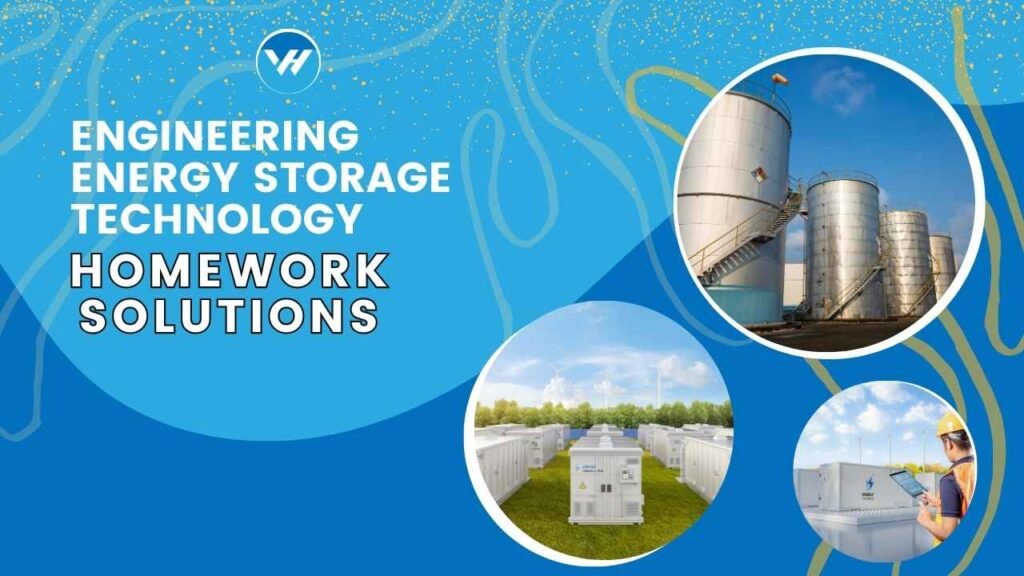Welcome to the fascinating world of Engineering Energy Storage Technology! If you’ve ever wondered how we can store and manage energy more efficiently, you’re in the right place. This field is crucial for developing sustainable energy solutions, and understanding it is key for any aspiring engineer. So, let’s dive into this topic and explore how you can ace your energy storage technology homework with some helpful tips and resources.

Table of Contents
ToggleWhat is Energy Storage Technology?
Energy Storage Technology refers to the methods and devices used to store various forms of energy for later use. Whether it’s capturing solar power, harnessing wind energy, or storing electricity, these technologies are vital for balancing supply and demand. There are several types of energy storage technologies, each with its unique applications and benefits.
Importance of Energy Storage in Engineering
Energy storage plays a pivotal role in modern engineering projects. It enhances the efficiency and reliability of power systems, enables the integration of renewable energy sources, and contributes to the overall sustainability of energy use. Without efficient energy storage solutions, managing intermittent energy sources like solar and wind would be nearly impossible.
Common Challenges in Energy Storage Technology Assignments
When it comes to homework assignments in energy storage technology, students often face several challenges:
- Complexity of Concepts: Understanding the intricate details of different storage technologies can be daunting.
- Practical Applications: Applying theoretical knowledge to real-world scenarios requires a deep understanding.
- Technological Advancements: Keeping up with the latest innovations in this rapidly evolving field can be tough.
Tips for Tackling Energy Storage Technology Homework
To effectively handle your energy storage technology homework, consider the following tips:
- Understanding the Basics: Start with a solid foundation of the fundamental concepts.
- Research and Resources: Utilize online resources, textbooks, and academic papers to gather information.
- Practical Application and Examples: Look for real-world examples and case studies to see how theoretical concepts are applied.
Key Components of Energy Storage Systems
Energy storage systems comprise various components, each crucial for different applications:
- Batteries: Widely used for their versatility and efficiency.
- Supercapacitors: Known for rapid energy discharge and recharge cycles.
- Flywheels: Ideal for applications requiring high energy density.
- Thermal Storage: Useful for managing heat energy in industrial processes.
Battery Technologies
Batteries are the most common form of energy storage. They come in various types, including:
- Lithium-Ion Batteries: Popular for their high energy density and long life.
- Lead-Acid Batteries: Economical and reliable for large-scale storage.
- Nickel-Cadmium Batteries: Known for their durability and performance in extreme temperatures.
Each type has its pros and cons, making them suitable for different applications.
Advanced Energy Storage Technologies
The field of energy storage is continuously evolving. Some of the emerging trends include:
- Solid-State Batteries: Promising higher energy densities and safety.
- Flow Batteries: Offering scalability and long-duration storage.
- Hydrogen Storage: Enabling large-scale, long-term energy storage.
These innovations are paving the way for more efficient and sustainable energy solutions.
How Virtual Help Can Assist with Energy Storage Technology Homework
Virtual Help is an online platform that connects students with expert tutors and provides assignment assistance. Here’s how it can help you:
- Overview of Virtual Help: An app-based service available on iOS and Android.
- Features and Benefits: Access to a wide range of tutors, 24/7 availability, and personalized assistance.
- How to Use the Platform: Simply download the app, sign up, and start finding tutors for your specific needs.
Best Practices for Efficient Study and Homework Completion
To excel in your studies, follow these best practices:
- Time Management: Allocate specific times for studying and stick to a schedule.
- Utilizing Available Resources: Make use of textbooks, online courses, and tutoring services.
- Collaboration and Peer Support: Study with classmates and discuss challenging topics.
Real-World Applications of Energy Storage Technology
Energy storage technology is used in various industries, such as:
- Renewable Energy: Balancing supply and demand in solar and wind power systems.
- Electric Vehicles: Providing power and extending the range of EVs.
- Grid Stability: Enhancing the reliability and efficiency of power grids.
These applications demonstrate the impact of energy storage on sustainability and efficiency.
Conclusion
Understanding energy storage technology is essential for modern engineering. By mastering these concepts, you’ll be well-equipped to tackle any related homework or projects. Remember to use resources like Virtual Help to get the assistance you need and stay ahead in your studies.
FAQs
How can I get help with my Energy Storage Technology homework?
Use Virtual Help to find expert tutors who can assist with your assignments and concepts.
What are the most common mistakes students make in Energy Storage Technology assignments?
Common mistakes include not fully understanding the basics and failing to connect theory with practical applications.
How does Virtual Help ensure the quality of the tutors?
Virtual Help vets its tutors for their expertise and teaching abilities to ensure quality assistance.
Can I find specialized tutors for specific topics within Energy Storage Technology on Virtual Help?
Yes, Virtual Help offers tutors with expertise in various subfields, providing tailored assistance.
What resources are available for understanding advanced Energy Storage Technologies?
Academic journals, online courses, and industry reports are great resources for in-depth knowledge on advanced technologies.





